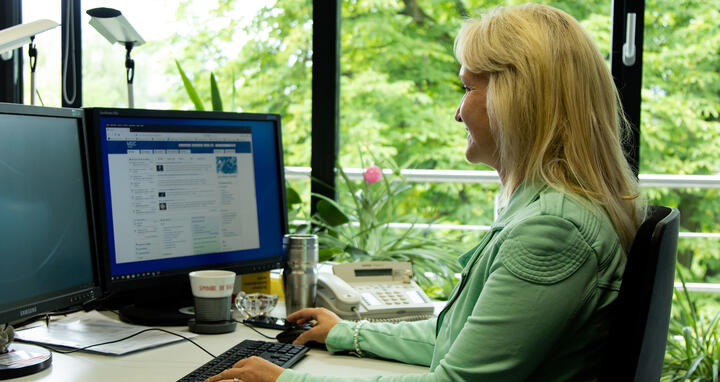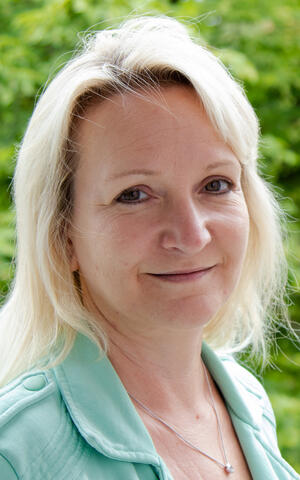„I’m there for disabled employees”
About our “We at the MDC” series
The MDC aspires to provide all employees with an attractive work environment – through an outstanding infrastructure and through collaboration with leading researchers, but also by being a place where tolerance, respect, and good interpersonal relations are paramount. It doesn’t always succeed in equal measure at attaining these aims. Our series introduces you to people who are engaged in this field. It also sheds light on internal processes that seek to ensure a positive organizational culture. And it provides tips for an attentive togetherness.
Read more about the series “We at the MDC”.
When Marion Posselt-Hofmann put herself forward in November 2018 for the upcoming Disabilities Officer election, none of those affected actually knew who she was. Nevertheless, she was appointed by the MDC’s disabled employees for a four-year term. “This is a topic that’s very close to my heart,” explains Posselt-Hofmann. “It seems I was able to communicate that with conviction at the election event.” Since the summer of 2017, she has been working as a clerk in the MDC’s Travel Expense Office. She has previous experience as an employee representative and is herself affected by a disability.
Posselt-Hofmann quickly discovered that, although disabilities representation was not new at the MDC, it was largely undeveloped in many areas. “I had to initiate quite a lot, which I hadn’t expected,” she says. “Many of those responsible at the MDC, but also many affected employees, did not know what rights disabled people have and what a Disabilities Officer really does.” Every employer in Germany with at least 20 members of staff is obliged to fill a minimum of five percent of its positions with disabled employees. Those who do not meet that quota must pay a compensatory levy. This includes the MDC, where the quota currently stands at 3.1 percent. This corresponds to 35 staff members with disabilities, who work in all areas from administration to science. “I am here for these people,” says Posselt-Hofmann. Her statutory duty is to represent the interests of disabled employees and to promote their integration.
Solving problems and helping with applications
If any of these employees should have particular requirements, such as a special table or chair, or need flexible working hours, she is there to help. The Disabilities Officer therefore not only serves as a mediator between manager, team, and disabled employee, but also knows what grants are available – for example, for structural changes like installing a ramp.
Posselt-Hofmann also provides advice and support to employees applying to have their degree of disability established. This initial assessment is the first step towards gaining formal disability recognition and applies, for example, to workers who have been in an accident or who are chronically ill.
In her role as Disabilities Officer, she also makes sure that disabled people applying for positions at the MDC are given a fair chance vis-à-vis other candidates. “I have to assess whether disabled applicants are equally well suited for the advertised position,” explains Posselt-Hofmann. “If they are, I can help make sure they get hired.” This is because the law stipulates that if opinions differ, the question of who gets a job must be discussed with the Disabilities Officer. Posselt-Hofmann wants to significantly increase the proportion of disabled employees, including trainees. “This is very important to me,” she says, “as I see the MDC as a public employer with a duty in this respect.”
An inclusion agreement for better participation
Posselt-Hofmann has now been in office for six months. Many things are going well, she reports, such as cooperation with the Staff Council and regular meetings with the Board of Directors. So far,
solutions have been found for almost all problems in the workplace. She has had varying experiences with MDC management staff. “Some are reserved, and some not interested at all,” she says. “Others are open and ask a lot of questions – sometimes even develop their own concepts. This makes working together fun.”
The Disabilities Officer has set herself ambitious goals for the coming years. She wants to conclude an inclusion agreement with the MDC in order to improve the participation of its disabled employees in working life through practice-based agreements. This would include, for example, employees with physical disabilities being granted not only any technical assistance they require, but also the additional time they need to complete tasks.
She also believes in the importance of a comprehensive preventative health policy, which she envisages including more opportunities for exercise and help with stress or organizational management. Ideally, employees with disabilities should be able to use such services at least partly during working hours.
Visibility promotes tolerance
Posselt-Hofmann’s job has some quite contradictory aspects. On the one hand, she wants to achieve greater visibility for MDC employees with disabilities as a whole. She calls this “public relations work.” She wants to make management staff aware of the duties and opportunities that arise from having a disabled person on a team, make disabled employees more aware of their rights, and enforce these rights. However, employees with disabilities often shy away from such “visibility.” Posselt-Hofmann believes that many of those affected by a disability at the MDC do not reveal it because they fear a lack of understanding or being treated differently.
As she also wants to be there for these people, her services are strictly confidential. “But I think it’s important for the company’s working environment that we deal openly with the topic of disability in order to promote tolerance,” she says. In addition, recognition of a serious disability has tangible benefits for those concerned, such as the right to more leave.
The Disabilities Office is a one-person department. Only when Posselt-Hofmann goes on holiday does she inform her temporary replacement of the current cases. She had envisaged dedicating about 25 percent of her working time to the role, with priority always being given to her work as a disabled persons’ representative. She therefore has less time for her main job these days. But she hopes this will soon change once she has achieved the progress she is currently fighting for.
Text: Wiebke Peters






